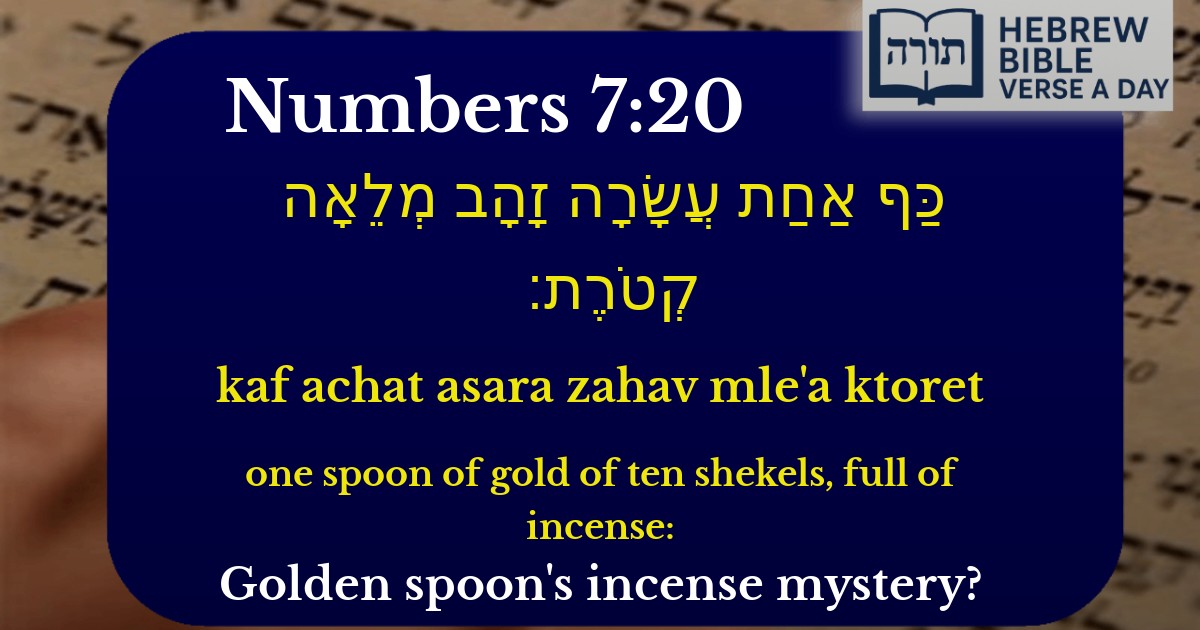Join Our Newsletter To Be Informed When New Videos Are Posted
Join the thousands of fellow Studends who rely on our videos to learn how to read the bible in Hebrew for free!
Hebrew Text
כַּף אַחַת עֲשָׂרָה זָהָב מְלֵאָה קְטֹרֶת׃
English Translation
one spoon of gold of ten shekels, full of incense:
Transliteration
Kaf achat asara zahav mle'a ktoret
Hebrew Leining Text
כַּ֥ף אַחַ֛ת עֲשָׂרָ֥ה זָהָ֖ב מְלֵאָ֥ה קְטֹֽרֶת׃
כַּ֥ף אַחַ֛ת עֲשָׂרָ֥ה זָהָ֖ב מְלֵאָ֥ה קְטֹֽרֶת׃
🎵 Listen to leining
Parasha Commentary
📚 Talmud Citations
This verse is not quoted in the Talmud.


Explanation of the Verse
The verse "כַּף אַחַת עֲשָׂרָה זָהָב מְלֵאָה קְטֹרֶת" (one spoon of gold of ten shekels, full of incense) appears in the context of the contributions made by the tribal leaders (נשיאים) for the dedication of the Mishkan (Tabernacle), as described in Bamidbar (Numbers) 7:14. This offering was brought by Nachshon ben Aminadav, the prince of the tribe of Yehudah.
Symbolism of the Golden Spoon (כַּף זָהָב)
Rashi explains that the כַּף (spoon) was a vessel used for holding the קטרת (incense). The fact that it was made of gold signifies the importance and sanctity of the incense offering, which was a central component of the Avodah (Temple service). The Ramban adds that gold represents purity and enduring value, reflecting the eternal nature of the service of Hashem.
Weight of Ten Shekels (עֲשָׂרָה זָהָב)
The weight of the spoon—ten shekels—carries symbolic meaning. The number ten is significant in Jewish tradition, representing completeness, as seen in the Ten Commandments, the Ten Utterances of Creation, and the minyan (quorum of ten for prayer). The Midrash (Bamidbar Rabbah 13:15) suggests that the ten shekels allude to the Ten Trials of Avraham Avinu, emphasizing dedication and sacrifice in serving Hashem.
The Incense (קְטֹרֶת)
The ketoret (incense) was a unique offering with deep spiritual significance. The Talmud (Keritot 6b) teaches that the ketoret atones for sins and fosters unity among the Jewish people. Its ingredients, as detailed in Shemot (Exodus) 30:34-38, were carefully measured and blended, symbolizing harmony and the integration of different spiritual qualities in divine service.
Connection to the Mishkan
The Sforno notes that the leaders' offerings, including this golden spoon of incense, were not merely material contributions but represented their total devotion to the Mishkan’s sanctity. The incense, offered daily on the golden altar, served as a constant reminder of the Jewish people’s connection to Hashem.